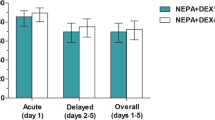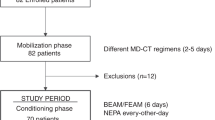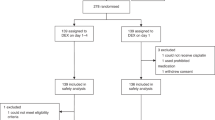Abstract
High dose metoclopramide is an effective anti-emetic for use with cisplatin containing chemotherapy regimens but can cause extrapyramidal reactions. Lorazepam and dexamethasone are increasingly being used to alleviate chemotherapy induced emesis. This trial has assessed the contribution of high dose metoclopramide to anti-emetic control when given with dexamethasone and lorazepam. Eight-one patients receiving chemotherapy, mainly for gynaecological malignancy, entered a randomised double blind cross-over trial comparing dexamethasone and lorazepam with or without a 24 h metoclopramide infusion. This was followed by oral dexamethasone with or without oral metoclopramide for three further days depending on the initial randomisation. Sixty-one patients were fully evaluable. Fifty-five received cisplatin containing regimens and six non-cisplatin regimens. There was a significant reduction in the number of episodes of vomiting during the first 24 h in patients receiving the metoclopramide combination (P = 0.0001). On first exposure to chemotherapy 45% of patients receiving dexamethasone, lorazepam and high dose metoclopramide had no vomiting while 67% had two episodes or less ('major control'). This compared to 11% total control and 25% major control in those receiving dexamethasone, lorazepam and placebo. The control of nausea in the first 24 h was also improved (P = 0.0001). There was no difference in the degree of nausea or vomiting during the following three weeks between those receiving oral dexamethasone alone and those receiving dexamethasone and metoclopramide. Both groups showed a significant increase in nausea in the three weeks following the second course of treatment when compared to the first (P = 0.0007). Extrapyramidal reactions were recorded in 11.5% of patients receiving metoclopramide. More patients stated a preference for the metoclopramide combination although this was not statistically significant (chi 2(1) = 0.29, P = 0.59). In conclusion the combination of dexamethasone and lorazepam can give major control of emesis in 25% of patients receiving very emetogenic chemotherapy. The addition of metoclopramide increases this to 67% on first exposure to chemotherapy, but at the expense of extrapyramidal reactions in 11.5%.
This is a preview of subscription content, access via your institution
Access options
Subscribe to this journal
Receive 24 print issues and online access
$259.00 per year
only $10.79 per issue
Buy this article
- Purchase on Springer Link
- Instant access to full article PDF
Prices may be subject to local taxes which are calculated during checkout
Similar content being viewed by others
Author information
Authors and Affiliations
Rights and permissions
About this article
Cite this article
O'Brien, M., Cullen, M., Woodroffe, C. et al. The role of metoclopramide in acute and delayed chemotherapy induced emesis: a randomised double blind trial. Br J Cancer 60, 759–763 (1989). https://doi.org/10.1038/bjc.1989.354
Issue Date:
DOI: https://doi.org/10.1038/bjc.1989.354
This article is cited by
-
A microfabricated potentiometric sensor for metoclopramide determination utilizing a graphene nanocomposite transducer layer
Analytical and Bioanalytical Chemistry (2020)
-
Is delayed chemotherapy-induced emesis well managed in oncological clinical practice?
Supportive Care in Cancer (2003)
-
Serotoninantagonisten: effektive Prophylaxe und Therapie des zytostatikainduzierten Erbrechens
European Surgery (1993)



